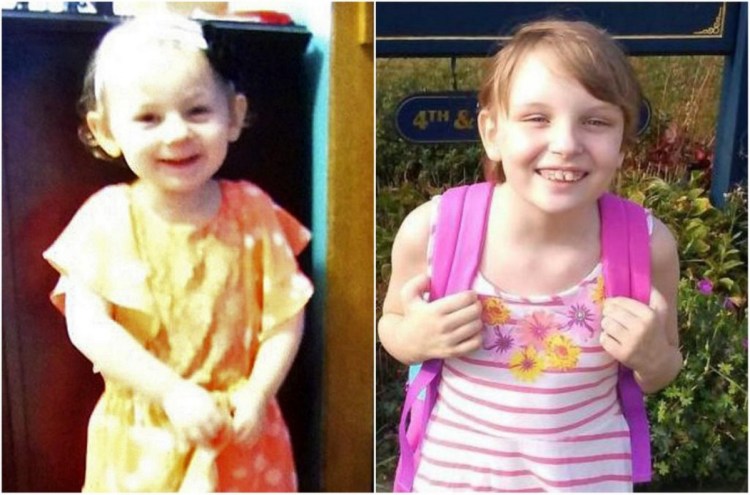Witnesses before a legislative committee investigating the deaths of two young girls in 2017 and 2018 said Friday that the state needs to make protecting its children a top priority, and not base those efforts on the funding that is available.
The testimony came during a public hearing on a report that detailed the experiences of front-line workers in the state’s child protective system, run by the Maine Department of Health and Human Services.
The report was issued in February, six months after the Portland Press Herald/Maine Sunday Telegram published a detailed examination of the child protective system. The story found the system was hobbled by overburdened caseworkers, staffing shortages, inefficient computer systems and a lack of foster families that was forcing caseworkers to supervise abused or at-risk children in hotels and hospitals for long periods, among other issues.
Marissa Kennedy, 10, of Stockton Springs died in February 2018 and Kendall Chick, 4, died in Wiscasset in December 2017, both as a result of child abuse, law enforcement officials said.
A range of witnesses – including advocates for children, retired social workers, foster parents and the state’s new commissioner of Health and Human Services, Jeanne Lambrew – reacted to the report issued by the committee’s investigative arm, the Office of Program Evaluation and Government Accountability.
The Government Oversight Committee, which directs OPEGA and presided over Friday’s public hearing, also heard an allegation that there may have been at least three other child deaths that resulted from gaps in the system similar to those linked to the deaths of Kennedy and Chick.
Brian Houston, a Gardiner resident, told the committee that he had information on three additional children who had died, including two in 2015 and one in 2018.
Houston declined to provide additional details during the public hearing, but told lawmakers on the committee that he would speak privately with investigators at OPEGA. Houston also said he and his wife are licensed foster parents and that he was fearful of speaking out publicly because he worried about repercussions from the state.
“However, I’m more afraid for the children in state custody or those who soon may be,” he said.
Lambrew, appointed to head the state’s largest and most costly department by Gov. Janet Mills in December, said the information in the OPEGA report was being taken seriously. She also said workers’ concerns within the department’s Office of Children and Family Services were being listened to and acted on.
An earlier report by OPEGA found that child protective workers failed to follow policies and procedures in assessing the placement of the girls who died. In one case, OPEGA determined there were widely scattered reports of potential abuse or neglect, but information that might have led to a reassessment of the situation and prompted intervention was not shared at critical moments.
Lambrew said DHHS was moving forward with changes, including those required and funded in a law passed by the Legislature in September 2018 in response to the deaths of Kennedy and Chick. Among other measures, the law provides funding for a new computer and software systems to streamline documentation and data collection for caseworkers. That will free them to spend more time in the field helping children and families, Lambrew said.
She detailed four other actions DHHS is taking, including hiring additional intake workers, modernizing the agency’s phone systems to improve call routing and callback capabilities, an improved in-house criminal background check system and an ongoing effort to collaborate with staff to implement 84 other recommendations that came as the result of various investigations and reviews following the two girls’ deaths.
“These changes represent an important first step towards long-term improvements in Maine’s child welfare system, but much work remains,” Lambrew said. She said the agency was working “to develop and implement changes quickly while also ensuring that this work is done thoughtfully so that changes are sustainable into the future.”
Pamela Day, a retired social worker who works with the Opportunity Alliance, the Maine Children’s’ Alliance and with Adoptive and Foster Families of Maine, urged lawmakers to not cut corners and to even change a law that directs DHHS to take action in child protective cases based on available funding.
Day said that if demand for child protective services grows, then the state should have a ready pool of available caseworkers to ensure existing staff are not overwhelmed. She said other states, including Delaware, had systems that were designed to flex with trained staff available as needed.
Shawn Yardley, a foster and adoptive parent, former DHHS caseworker and a board member of the Maine Children’s Alliance, said that even with his experience in the human services system, education and knowledge, he and his wife at times struggled to navigate Maine’s system.
He urged the committee to “make it a priority of making our children safe in Maine.”
Scott Thistle can be contacted at 791-6330 or at:
sthistle@pressherald.com
Twitter: thisdog
Send questions/comments to the editors.



